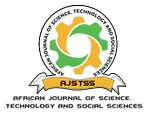Innovative pedagogy of competence based training in horticulture: case study of TVET Education in Kenya
DOI:
https://doi.org/10.58506/ajstss.v2i2.154Keywords:
enterpreneurshp, horticulture innovation hubs, problem based learning, result based extension, student attachment, competency based educationAbstract
Horticulture is the fastest growing sub-sector in Kenya. It contributes the most towards the envisioned poverty reduction, and overall food security. It is generally a labour-intensive industry with high demand of skilled workers, trained supervisors and professional managers. Most Agricultural Technical and Vocational Education Training colleges (ATVETs) have a very general focus and there is lack of specialized and competent workforce in horticulture. The training is classroom and institutional centred with limited access to necessary resources and facilities, and limited interactions with industry and world of work. In this project, a consortium of partners worked with selected ATVETs to close the skills gaps using a non-traditional pedagogy of competency based training in horticulture. This was by strengthening the capacity of the ATVETs through a strong collaboration and linkages between the education institutions and the private sector to enable practical learning and innovation in the horticulture sector. The project integrated the curriculum for horticulture, water and climate to suit the needs of the students and the labour market, and tailored it to the local context. Each of the participating colleges invested in hands-on training through dedicated agricultural innovation hubs and creating strong links with the local stakeholders. To compliment curricula developed by the Curriculum Development Assessment and Certificate Council (CDACC), training manuals were developed for selected courses. In addition tutors were trained to enhance their capacity in design, delivery and evaluation of competence based education. Problem based learning in the Kenyan context as well as joint learning sessions between Kenyan and Dutch students were the other non-traditional pedagogy methodologies that were explored. The project increased interactions between the ATVET, industry and partners in horticulture within Kenya and in the Netherlands. The ATVETs created more local partnerships relevant to their training and practical work. The students were the primary beneficiaries through enhanced quality teaching. These benefits have been cascaded to the surrounding communities and the impact is expected to be sustainable.
Downloads
Published
Versions
- 2024-04-29 (2)
- 2024-04-22 (1)


